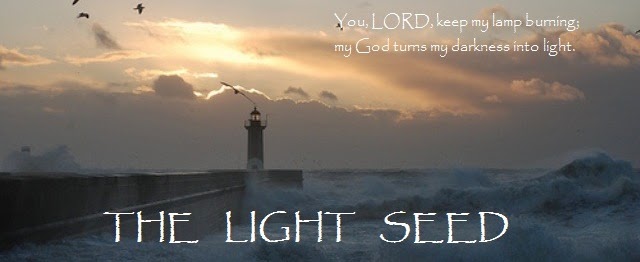Published by Jean-Louis Mondon
|
The entry
from "Streams in the Desert" below and the following poem reminds
me of a time of struggle in my life some time ago which was exacerbated by a
horrible cold winter weather. Since I was working outside a house washing up
the deck with a pressure washer in freezing temperature it was hard for me to
muster positive and uplifting thoughts about my life. But God....
It is always when the situation is dire and we feel like giving up and crawl under the blankets of temporary comfort, whatever they happen to be, that God in his mercy and grace shows up (although he is always Jehovah Shamah, the God who is there). Through the Holy Spirit eyes, we see things unseen to us and we hear the Lord talking to us through nature, things that we were oblivious to because we focused our attention on ourselves and on the raging waves and not on our compassionate Lord and his power to take us through the rough places in life. As I started crying out for help, the Lord opened my eyes which focused on a beautiful naked bush which I had not noticed all morning long. The peculiar thing about this bush is that only one single beautiful tiny red flower had survived the wintry elements and was offering hope and a lesson in perseverance against all odds by the brightness of its color . The Lord was showing me that even though under the frigid rigor of winter, the earth appears to be stripped and dead and shares its gloom with us humans, the blood of Jesus shed for our sin is a reason for great rejoicing and patience. This was just a season that the Lord in his wisdom uses to strengthen our faith and dependence on him in everything. This small red blossom was a reminder from my Lord Jesus´suffering and death on the cruel cross and that because of his willingness to be obedient unto death, a new abundant, wonderful and eternal life would be given as a free gift to those who repent and believe in him through the power of his resurrection. This thought was enough to lift me up and to be greatly encouraged to endure winter and life´s passing trials and rejoicing while keeping my eyes and mind on Christ´s soon return and the blessings of a life without suffering, trials, tears and death spent in forever praising and glorifying our Blessed Father, Lord Jesus and our dear comforter, the Holy Spirit who always stands ready to encourage and stay alongside us to help us bear whatever comes to us. May you you receive Holy Spirit comfort and encouragement today. The Lord knows what you are going through and he cares about you. Help is already on the way as he hears and answers the fervent prayer of his righteous children. Jean-Louis.
___________________________________________________________________
John's main business was to bear witness to the Light, and this may be yours
and mine. John was content to be only a voice, if men would think of Christ.
Be willing to be only a voice, heard but not seen; a mirror whose surface is lost to view, because it reflects the dazzling glory of the sun; a breeze that springs up just before daylight, and says, "The dawn! the dawn!" and then dies away. Do the commonest and smallest things as beneath His eye. If you must live with uncongenial people, set to their conquest by love. If you have made a great mistake in your life, do not let it becloud all of it; but, locking the secret in your breast, compel it to yield strength and sweetness. We are doing more good than we know, sowing seeds, starting streamlets, giving men true thoughts of Christ, to which they will refer one day as the first things that started them thinking of Him; and, of my part, I shall be satisfied if no great mausoleum is raised over my grave, but that simple souls shall gather there when I am gone, and say: "He was a good man; he wrought no miracles, but he spake words about Christ, which led me to know Him for myself." --George Mathison
"THY HIDDEN ONES" (Psa. 83:3)
"Thick green leaves from the soft brown earth, Happy springtime hath called them forth; First faint promise of summer bloom Breathes from the fragrant, sweet perfume, Under the leaves. "Lift them! what marvelous beauty lies Hidden beneath, from our thoughtless eyes! Mayflowers, rosy or purest white, Lift their cups to the sudden light, Under the leaves. "Are there no lives whose holy deeds-- Seen by no eye save His who reads Motive and action--in silence grow Into rare beauty, and bud and blow Under the leaves? "Fair white flowers of faith and trust, Springing from spirits bruised and crushed; Blossoms of love, rose-tinted and bright, Touched and painted with Heaven's own light Under the leaves. "Full fresh clusters of duty borne, Fairest of all in that shadow grown; Wondrous the fragrance that sweet and rare Comes from the flower-cups hidden there Under the leaves. "Though unseen by our vision dim, Bud and blossom are known to Him; Wait we content for His heavenly ray-- Wait till our Master Himself one day Lifteth the leaves." "God calls many of His most valued workers from the unknown multitude" (Luke 14:23). |
|||||||||||
The public domain version of this classic devotional is the unabridged
edition of Streams in the Desert. This first edition was published in 1925 and
the wording is preserved as originally written. Connotations of words may have
changed over the years and are not meant to be offensive.





